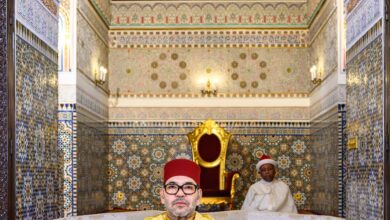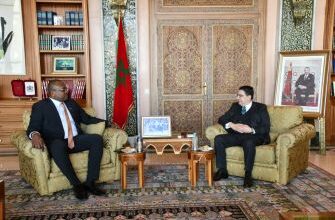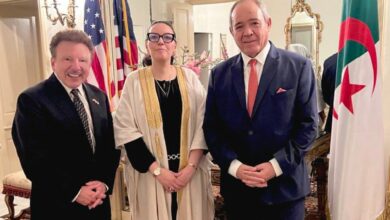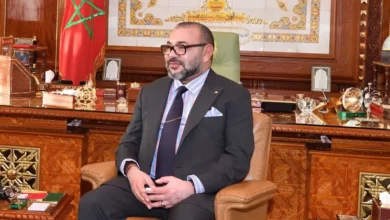For 25 years, Morocco has embarked on an “irreversible march” under the impetus of His Majesty King Mohammed VI, toward gender equality, implementing constitutional, legislative, and institutional reforms, Foreign Minister, African Cooperation Minister, and Minister for Moroccans Abroad Mr. Nasser Bourita said on Wednesday in Paris.
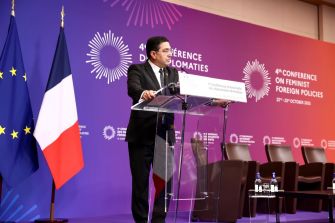
“These reforms have not only changed the letter of the law but have also transformed the mindset of a generation, fostering a society that recognizes equity as the foundation of its modernity,” Mr. Bourita said at the opening of the 4th Conference on Feminist Foreign Policies.
The event was attended by foreign ministers from around fifty countries, including Jean-Noël Barrot, French Minister for Europe and Foreign Affairs, and José Manuel Albares, Spanish Minister of Foreign Affairs.
The minister highlighted Morocco’s membership in the Feminist Foreign Policy Group (FFP+), noting that by joining this group, Morocco “embraces an ambition: to act in concert with countries that share these values and make them a core axis of their diplomatic efforts.”
“Our confidence stems from His Majesty King Mohammed VI’s decision to place women’s rights and equality at the center of His reign,” the minister added.
Mr. Bourita also stressed that Morocco’s domestic transformation has naturally extended to external action, noting that the country has placed equality at the heart of its diplomacy.
“Our feminist diplomacy is, first and foremost, diplomacy in the service of peace,” Mr. Bourita said, recalling that in March 2022, Morocco adopted its first National Action Plan for implementing UN Security Council Resolution 1325 on Women, Peace, and Security.
“We have just extended it through 2026 to strengthen its achievements and place women even more at the center of prevention, mediation, and reconstruction efforts,” he added.
The minister also noted that Morocco is the ninth-largest contributor to UN peacekeeping operations, with “3,400 deployed peacekeepers, 120 of whom are women. We will continue to strengthen their presence in our contingents and headquarters.”
Beyond peacekeeping, Morocco also acts proactively to consolidate peace. “We train mediators, women on the ground who embody close-proximity diplomacy. They defuse tensions within communities, restore trust, and rebuild connections,” Mr. Bourita said.
In the same spirit, “we train electoral observers in partnership with the African Union,” the minister added, noting that between 2022 and 2025, Morocco trained several African observers, including 175 women out of a total of 300 graduates.
The Kingdom’s feminist diplomacy also extends to the religious sphere, which he describes as an essential lever of stability and peace.
“Our commitment is also reflected in our migration policy. Women account for nearly half of regular immigrants in Morocco, and our two regularization campaigns in 2014 and 2017 offered them protection and dignity. This is another aspect of our feminist diplomacy: one that rejects exclusion,” Mr. Bourita said.
At the UN Human Rights Council in Geneva, he recalled, Morocco sponsored a historic resolution in April on “Women, Diplomacy, and Human Rights,” strengthening the institution of the “International Day of Women in Diplomacy,” placing the issue of women’s under-representation in diplomacy on the international agenda, and urging states to ensure equal access to diplomatic roles and prevent all forms of discrimination.
“Finally, our feminist diplomacy is expressed bilaterally. This approach is concretely reflected in our dialogue with France, where equality is a pillar of our exceptional partnership, as well as with Spain through regular political consultations,” he said, adding that it also extends to cooperation with Japan (e.g., around the Women, Peace, and Security agenda) and interactions with Latin American countries, a path Morocco intends to continue pursuing.
In all fields, “women’s inclusion is a factor of collective efficiency,” the minister said. In peace, first: women’s participation in negotiation processes increases the chance of an agreement lasting for more than two years by 20% and for fifteen years by 35% ,” he said.
In the economy, “the active inclusion of women in work, business and governance is not only an element of equality, but a lever for growth and performance. Closing the gender gap could, according to the World Bank, improve global GDP by more than 20%,” Mr. Bourita explained.
In security, similarly: “studies show an inverse correlation between gender quality and radicalization; the more a society is egalitarian, the less it is exposed to extremist drifts,” he added.
“Finally, when it comes to climate change, the evidence is just as clear: while women are the first victims, investing in gender equality could reduce global greenhouse gas emissions by up to 15% by 2050,” the minister noted.
“Because feminist diplomacy cannot be deployed externally without internal consistency, we have chosen—within our own diplomatic apparatus—to open up avenues that had been blocked by certain prejudices or biases,” Mr. Bourita emphasized.
“We are doing this through merit-based diplomacy, where competence is combined with both female and male talent,” he said.
At headquarters, 43% of the ministry’s staff are women, and 47% of senior positions are held by women. Abroad, one-third of our diplomatic and consular posts are headed by women (45 out of 155, or 29%, including 21 out of 95 embassies and 24 out of 60 consulates). Between 2004 and 2024, they have gone from 3% of Consuls General to 40%—and they are often among the best. And from 4% across the diplomatic network, they now account for 21% of ambassadors—at the head of some of the most strategic embassies,” he said.
He added that “between now and then, it is not a question of making amends through favors or balancing the numbers, but of doing justice through high standards—the same for everyone, adapted to each individual—and women have never failed to deserve it.”
“Although the concept originated in the North, feminist diplomacy is not the exclusive property of the North. As is often the case in multilateralism, co-appropriation is the key to universality,” the minister observed, adding that this diplomacy benefits from being rooted in a plurality of experiences and trajectories.
According to Mr. Bourita, the strength of the FFP+ will depend on its ability to listen and integrate, to expand without diluting itself, to bring people together without standardizing them. “Secondly, the strength of the network lies not only in the nobility of its principles, but in its ability to translate them into concrete actions and follow them up with efficient evaluation and accountability mechanisms. For feminist diplomacy to be a force for transformation, it must evaluate and correct itself and, over time, prove itself in practice,” he added.
Thirdly, “the FFP+ stands to gain from strengthening its links with major global issues. Because equality is not an isolated goal, the FFP+ must consolidate its foundations and multiply its alliances with other international frameworks to embody the cross-cutting nature of feminist diplomacy—which is not limited to a single area of advocacy, but permeates all global policies,” he added.
In this regard, the minister suggested setting up a joint training program, led by the FFP+, dedicated to feminist diplomacy and the implementation of the Women, Peace and Security Agenda, and creating concrete spaces for exchange and collaboration between women diplomats from all regions, to jointly strengthen a global Women, Peace, Development and Rights Agenda.
Other proposals included “promoting bilateral and triangular partnerships between members of the FFP+ network, in order to enable the exchange of best practices and transform our common ground into projects on the ground (mediation, climate, equal access to international positions),“ noted the minister, before concluding that ”feminist diplomacy is not a model to be exported, but an experience to be shared.”

